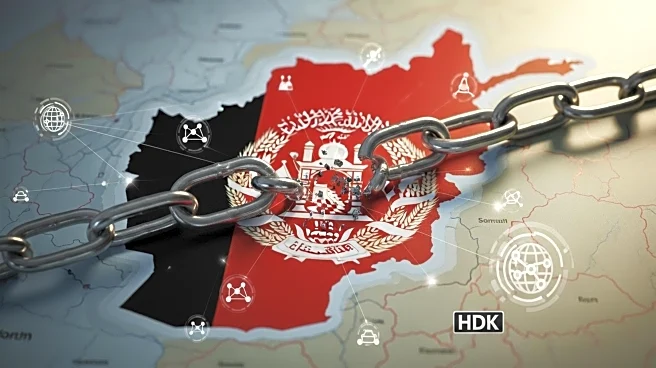What is the story about?
What's Happening?
Afghanistan is experiencing a nationwide internet blackout enforced by the Taliban, leading to widespread panic and deepening the country's economic crisis. The shutdown, linked to the Taliban's campaign against immoral activities online, has left connectivity at less than 1% of normal levels. Businesses reliant on mobile phones and internet services are frozen, and essential services are severely disrupted. The blackout has sparked alarm among Afghans abroad, who are unable to reach family members. The Taliban's actions have also impacted women's access to online education, further isolating them from opportunities for learning and empowerment.
Why It's Important?
The internet blackout in Afghanistan has significant implications for the country's economy and society. It disrupts communication, banking, and essential services, exacerbating the humanitarian crisis. The shutdown particularly affects women, who have relied on online education as a last resort due to restrictions on in-person schooling. The Taliban's actions may further isolate Afghanistan from the international community, impacting foreign aid and diplomatic relations. The shutdown reflects the regime's efforts to control information and suppress dissent, raising concerns about human rights violations.
What's Next?
The Taliban's decision to cut internet access may lead to increased international pressure and calls for restoration of services. Human rights organizations are likely to continue advocating for the rights of Afghan citizens, particularly women and girls. The blackout could also lead to internal dissent within the Taliban, as officials warn of the economic fallout. The regime may face challenges in maintaining control as public frustration grows, potentially leading to unrest and demands for change.
Beyond the Headlines
The internet blackout underscores the ethical and human rights challenges under the Taliban regime. The restriction of communication channels further isolates Afghan women, who have already faced severe limitations on education and employment. The blackout may also reflect internal power struggles within the Taliban, as hard-line leaders impose regressive rules that hamper the regime's emergence from isolation. The decision to cut internet access could backfire, leading to increased scrutiny and criticism from the international community.

















